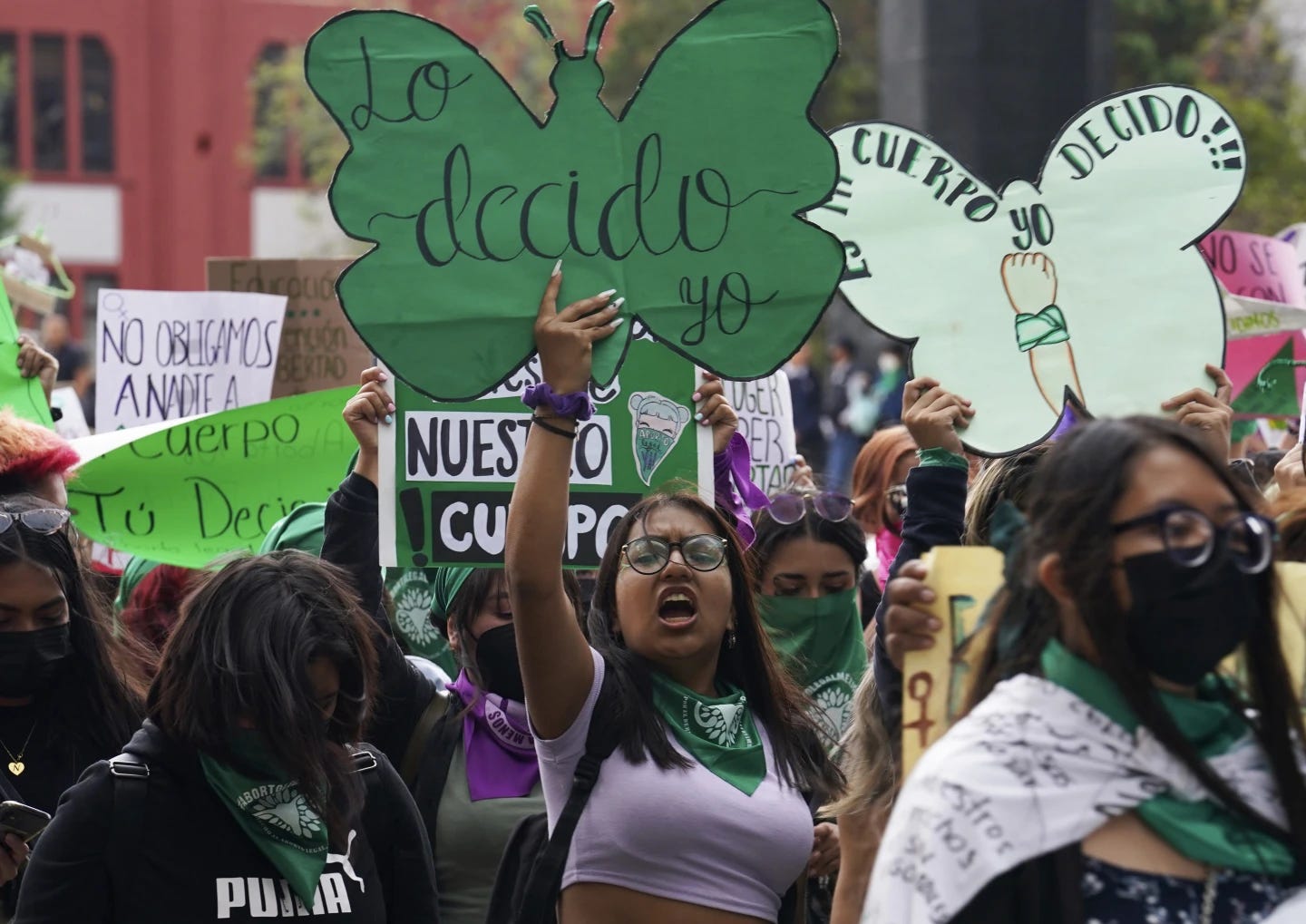I don’t understand why dear readers of this rag continue to encourage me to write about politics. Have you people no limits to your thirst for politics? Is there no Ozempic for your political appetites?
As someone who, at the risk of his mental well-being, is professionally obliged to dirty himself in politics, your choice to don this filthy hairshirt baffles me. Long ago, at my own peril, I chose to teach politics courses, thus perpetually pushing me neck deep into the shit-littered sandbox of political pablum.
But you? You could go on your merry way, doing whatever it is you do, averting your eyes from the dumpster fires, holding your nose while engaging in polite discourse, or just quietly gazing at your navel. But no. You wanna wade into the muck. To swim in this river of depravity.
A’ight. Bet.
Truth is, I did have a few reflections on politics this week that I might otherwise share only with my students or keep to myself. But since these reflections are hopeful in nature, I reckon I’ll share here.
For what are we without hope?
I teach a comparative politics class in which Mexico is one of the six case studies. So I’ve been thinking about Mexican politics rather seriously for 20 years. Parochialism, patronage, and patriarchy have been among the core problems inhibiting Mexico’s development. Agreeing it was necessary to advance political and economic life in Mexico, every year my students explore how to best bring women into the Mexican body politic.
Lo and behold, a political reform in 2014 brought hope. The Mexican constitution was amended, requiring that at least 50% of party candidates nominated for federal and local congressional elections be female. To give the amendment teeth, the National Electoral Institute has ensured that women are not just assigned to districts where a party won’t win anyway, a tactic that has diminished the impact of candidacy quotas in other countries. This was reform, not a radical revolution. And it worked.
On June 2, Mexican voters will head to the polls to choose between these two candidates.
Xóchitl Gálvez and Claudia Shienbaum might otherwise have been improbable political elites. Sheinbaum is a physicist who became politicized, rose through the ranks, and made history as Mexico City's first Jewish mayor. Gálvez is a computer engineer who entered politics after building a successful tech enterprise then gaining prominence as the leader of the National Institute of Indigenous Peoples.
Before you conclude that the forthcoming election is a mere aberration in the patriarchy, allow me to add that since this amendment was passed, Mexico ranks number 5 in the world in terms of gender parity in politics. The U.S. ranks 71. Yeah. 71. Well behind Uzbekistan and Moldova.
What happens when, through evolution not revolution, we creatively engineer space for women in politics? Quite a lot actually.
In September, Mexico’s Supreme Court ruled that national laws prohibiting abortion are unconstitutional because they violate women’s basic rights.
A decade ago, there was no discernible reason for Mexican women to hope for bodily autonomy. But the second most populous Catholic country in the world now allows women control over their bodies.
Sheinbaum currently is 20 points up on Gálvez and is highly likely to be the next president of Mexico. So Mexico will have a female president before the U.S. or Spain. Like all candidates, she’s imperfect. But she’s tough, she’s clever, and she’s empathic. Indeed, her empathy shined when as mayor of Mexico City, she became the first Mexican high office holder to attend a Pride March.
But this was more than a mere photo-op. At great political risk, Sheinbaum fiercely advocated for the abolition of gender-specific dress codes in Mexico City, proclaiming “the era in which girls had to wear a skirt and boys had to wear trousers a thing of the past…Boys can wear a skirt if they want to and girls can wear trousers if they want.”
Incidentally, the June 2 Mexican election is on a Sunday. Yes, in a country where 80% of citizens identify as Catholic, they have elections on Sunday. Why? Because people tend not to work on Sunday so they have fewer excuses to not vote. Why does America have elections on Tuesdays in November? Because in 1845, in the throes of the Second Great Awakening, when most people were farmers, it was so decided. Today, 1 in 50 Americans are farmers and 1 in 4 Americans claim they don’t vote because their work/family schedule will not allow them to make it to the polls.
You know who has time to vote? Old folks who love to vote for old folks.
The first Tuesday in November decidedly makes no sense. A rather small change in the electoral rules could advance American democracy. To me, it’s a no brainer. Despite the fact that it’s after the fall harvest and after All Saints Day, it’s dreadfully stupid. Fewer than 20% of American attend church on Sundays. Either way, 20% of the polling stations are in churches. So hardly a problem there.
My proposal: strike a deal with the NFL to campaign for voting on Sundays. The NFL might be the sleekest marketing machine out there.
To wit, when I was a lad, football was, in effect, exclusively a men’s affair. The NFL was missing out on half the market. So they rolled out a multi-pronged marketing campaign that launched the drama-drenched Monday Night Football (when women were more likely to be able to watch), annual breast cancer awareness initiatives, and an apparel line geared toward women. It worked. Women are now 40% of the NFL audience! This seemed impossible when I was a kid. Perhaps even less possible than a Jewish woman governing Mexico.
On the subject of women’s sports, which is hardly a subject of keen interest to me, not for my disinterest in women, but for my disinterest in watching people play sports, this week I enjoyed Daniel Tosh’s hilarious podcast interview with golf champ Michelle Wie West. She argued that one of the reasons people don’t watch women’s sports is because the production value of women’s sports is a fraction of that of men’s. Fewer and lower quality cameras. Less attention to sound and lights. Fewer and less distinguished announcers. Just a lower quality product overall. Makes sense, especially in light of how much attention (and high quality coverage) Caitlin Clark and the women’s NCAA tournament got this year. Hell, even I tuned in for that! Here’s to hope for women’s athletics.
You know what else makes sense? The presidential candidates in Mexico are 60 and 61 years old. Know what doesn’t make sense? Two dreadfully old men slapping their canes at each other, vying to be the leaders of the free world. Ya know what I’m tiring of? Otherwise well-intentioned Dems trying to convince me that the mental acuity of the President doesn’t really matter because the job is mostly performative and ceremonial. Biden doesn’t need energy or memory to govern; he just needs is a strong cabinet, they say. Do these folks actually believe what they're saying? I’ve said it before and I’ll say it again: here’s to hope that the Dems create an off ramp for Joe.
See! This is what happens when you get me hot on politics. Ugh. Here we go…
Do you know the story of Hadley Duvall? From the age of 5, Duvall was repeatedly raped by her stepfather (who is now in prison). At age 12, he impregnated her. She had an abortion. The day after the Supreme Court overturned Roe, she posted about her experience on Facebook. She said, “to tell a 12-year-old girl she must have the baby of her stepfather who raped her is unthinkable. I’m speaking out because women and girls need to have options.” Then Kentucky passed a draconian anti-abortion bill. Duvall became an unlikely activist. Unlikely because she is a senior at a small Christian college in Kentucky where pro-choice activism is, shall we say, unwelcome.

She came out to her classmates. The rape. The abortion. She’s that girl. Their reaction? Disgust? Intimidation? Hadley Duvall was elected as the 2023 Midway University Homecoming Queen. Did you see that coming? This story stirs hope.
Also at the ugly intersection of religion and politics, I’m a fanboy of the The Rest is History podcast. You should be too. They recently dropped a five-part series on Martin Luther that left me wondering how much the average Protestant knows about the life and times of the founder of their church. His challenge to THE Church made Luther a beacon of hope.
I was heartened when, in a landmark ruling earlier this year, the Vatican approved blessings for same-sex couples. Then, this week, the Pope called gender fluidity and surrogacy threats to human dignity. Oh the Vatican and “dignity”. Where to start? Meh. One step forward, one back. Still, I hope.
How could I teach without hope? Yesterday, I was giving a lecture about the election and domestic policies of the Kennedy administration. I was reminded of how impossible it was for a Catholic to become president of the United States. Months before the 1960 election, convinced that his religious affiliation was going to derail his candidacy, he took the risk to speak to a group of Protestant ministers in Houston who he implored to believe that "contrary to common newspaper usage, I am not the Catholic candidate for President. I am the Democratic Party's candidate for President who happens also to be a Catholic." Obama felt obliged to deliver a similar speech, not about his religion, but his race. Did I mention that the president of Mexico is going to be a Jewish lady?
Even more so, my talk about Kennedy was a fresh reminder that, as my northstar Studs Terkel explores in Hope Dies Last: Keeping the Faith in Difficult Times, there is and must be something indefatigable in our nature. Kennedy’s policy legacy was mixed at best. But Kennedy’s greatest legacy was speaking to this indefatigable spirit of hope that is at the core of each of us.
I’ll find mine if you find yours.
I turn 48 today. Here’s hoping for 48 more.
Yours,
D









Thanks for the hope.